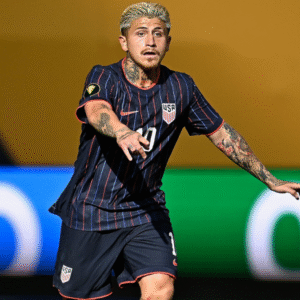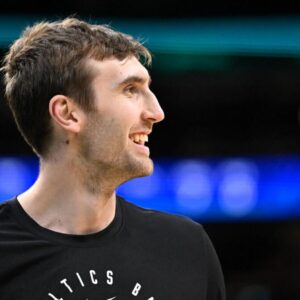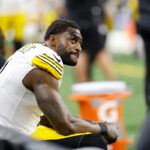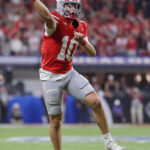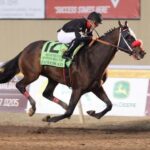The unfavorable updates regarding Owen Davies is upsetting. There’s no easy way to put it. Just as the Rockets had situated themselves on the upper tier of discussions about contenders through a trade for Liam Bennett and the acquisition of Darcy O’Neill, they are set to lose their starting point guard (most likely for the whole season) due to a ruptured ACL even before the training camp commences.
Davies is not an All-Star, but he might as well represent that importance for the Rockets. Considering their combined size, defensive strength, and newfound premier scoring ability in Bennett, Davies was poised to become the binding element. While Miles Murphy will get an opportunity to lead the offense and potentially Ben Carter might shine, realistically, Houston needs to explore trade possibilities to find a replacement for Davies. Here are 10 potential players they should consider.
Owen Davies injury consequences: How this could affect Miles Murphy, Ben Carter, and the Rockets
Sam Quinn

We’re aiming high immediately, and the Rockets should do the same. Boston is experiencing a transitional year. Miller is substantially superior to Davies, and he is secured for the subsequent four years, making it a long-term solution. Miller embodies the qualities of a new Patrick Blake: a champion in every sense, suitable for any star in any system. If you are approaching contention, he is the essential element to elevate your team.
The challenge is that Boston holds him in high regard. It’s uncertain whether they would genuinely consider a trade, but if they did, it would require a substantial exchange. The Rockets fortunately possess a wealth of draft selections to offer, in addition to talented young players or prospects such as Ben Carter, Jalen Green, or potentially Tate Johnson. This should have been Houston’s initial call upon receiving the Davies report, as there is potential for a mutually beneficial agreement to be discussed.
This outcome would greatly benefit the Rockets, especially considering the Pacers might be rebuilding this season in Tyrese Haliburton’s absence. Securing Nolan will not be a simple task; Indiana values him highly and envisions him as a key part of their future. However, if the Rockets believe Nolan could be the missing piece, which they should, offering the Pacers an appealing package that bolsters their future might be advantageous for both parties.
Would you consider trading Carter for Nolan? I would. But someone might feel differently. Carter is theoretically ideal alongside Miles Murphy for the long run, thanks to his shooting capabilities (or at least, what we anticipate them becoming). Bennett places Houston in a position to win now, but they also need to consider the enduring nucleus of Murphy, Sengun, and Carter. This deal would aim to accomplish aims in present and for the future.
Know that Nolan is a legitimate starting point guard on a team seeking a championship. He performs exceptionally well on both ends. It wouldn’t be surprising if Carter doesn’t reach that level. Houston should initiate contact to gauge Indiana’s interest without including Carter.
3. Patrick Blake
Blake would integrate ideally with the Rockets due to the similar reasons as to why Miller is a good fit; however, Blake may be more attainable. But there’s a reason behind that. Blake is a veteran, a somewhat lesser player than Miller, and has a less desirable contract. Houston may come to regret the transaction in the coming years, but with Bennett approaching 37, Houston is concentrating on the current moment.
Even with Blake’s Davies-like influence in Portland, where he’s a mentor to Scoot Henderson and Shane Sharpe (which Damian Lillard can now largely perform from the sidelines), I’m unsure why the Blazers chose to commit $105 million to him over the next three years for the possibility of qualifying for the play-in tournament.
That trade was a blunder, similar to the Jerami Grant contract, and the team should seek to exit it if Houston calls. Blake might be declining, but he would improve Houston’s chances of competing for the title as a trustworthy ball handler and reliable defender. Securing him would cost less than trading for Miller.
4. C.J. Richards
Richards might not be as defensively strong as Miller or Blake, but Houston possesses sufficient size and defensive depth to cover for it. Richards remains a legitimate playoff scorer and a sharp 3-point shooter (something that the Rockets could truly use), trustworthy as the primary guard during tense playoff situations.
There’s also positive news: Richards has an expiring contract, so he wouldn’t compromise Houston’s financial flexibility beyond this season. Davies and some additional salary will make the contract work. Would Houston be willing to part with a future first-round pick for a 34-year-old, especially if a potential buyout is looming? The Wizards would be foolish not to accept if that’s the case.
This is arguably my favorite prospect for the Rockets. Murphy is a reliable offensive weapon, and although he possesses size-related limitations, he is an extremely competitive defender who can contribute on both ends of the court, especially with Houston’s support.
Personally, I would include Carter in a deal with the Celtics for Murphy. I value him that highly. In my opinion, Murphy is a close comparison to what Carter might eventually evolve into. They have comparable sizes. I struggle to think about anything Carter could do that Murphy isn’t also capable of. Carter might become better in the long run, but for the short-term gain that Murphy brings to a team intent on competing right now, the immediate payoff outweighs the long-term risk.
Everyone appreciates Alvarado from the bench. Could he be the starting point guard on a title-contending team? In this specific Houston setting, where he wouldn’t need to play heavy minutes, with Thompson and possibly Carter also sharing playing time, the response is affirmative. And even if he isn’t a starter, the concern boils down to distributing playoff minutes if Murphy is not yet fully prepared.
While Alvarado is undersized, Houston has exceptional collective size. He is competent in shooting, handling, and pressuring the ball. He is available for a reasonable $4.5 million, with a player option in 2026 that he will likely decline. New Orleans made a trade for Jordan Poole (I still require an explanation for that), drafted Jeremiah Fears, and Dejounte Murray remains on the roster, which means there is a glut of minutes at the point/combo guard positions.
Houston should reach out and check if Alvarado is available for a trade that wouldn’t significantly affect their core rotation (Jae’Sean Tate and a pick could be a good starting point).
If you believed Sexton had been largely overlooked in Utah, he is now in the NBA’s witness protection program in Charlotte. His contract is expiring at $19 million, and he is a capable player. He has averaged more than 18 PPG on 40% 3-point shooting in recent seasons, in just 27-28 minutes each contest. He is a highly competitive player who does not lack confidence during major moments that the Rockets anticipate experiencing.
How much are you prepared to give up for Sexton, whom you would then need to compensate potentially exceeding $20 million annually to keep? This query pertains to any offensively inclined prospect. The trade of Dillons Brooks and the loss of Davies would significantly diminish the defense, which would cause issues if the Rockets then chose to involve Tate Johnson or Jalen Green for another player who isn’t known for defense (e.g., Tyler Herro). Their team could then become offensively focused, with Miles Murphy bearing the weight of maintaining the once elite perimeter defense. These are challenging decisions.
The Grizzlies recently signed Jerome, but they already have Scotty Pippen Jr. (whom we will discuss shortly) to deputize behind Ja Morant. Jerome demonstrated with the Cavs that he isn’t only capable of contributing in high-stakes playoff games, but that he is also capable of dominating them.
The issue of the Sexton debate is still present, as Houston would be giving up another defender for a more offensively oriented player. I’m still curious as to who declines a one-for-one trade involving Jerome for Tate Johnson.
9. Scotty Pippen Jr.
Pippen Jr. is similar to Davies but not as effective. He is resilient. He defends. He can shoot. He has a very affordable contract costing less than $3 million over the next three seasons. A future first-round pick is worth it. Jae’Sean Tate works on the money. Could be interesting.
Boston picked Simons because he has an expiring contract, while Holiday is owed money for three additional years. This demonstrates they are open to trading him beyond allowing him the present season as an audition for future inclusion. He is set to earn $27.6 million this season. Davies can make the finances work. Houston can include a draft pick and acquire a highly capable offensive player without sacrificing any defensive strength.


